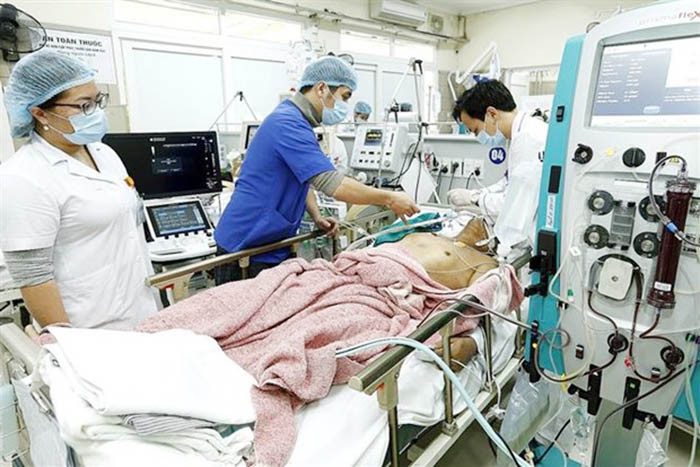Patients infected with streptococcus suis often have severe clinical symptoms, require long-term treatment, high treatment costs, and often leave irreversible complications after recovery.

Emergency treatment for patients at the Poison Control Center - Bach Mai Hospital. (Photo: Duong Ngoc/VNA)
According to the Ministry of Health's infectious disease surveillance system, in the first months of 2023, a number of cases of human streptococcal infection were recorded in a number of provinces and cities.
Typically, recently, Soc Son District Medical Center (Hanoi) successfully treated a case of grade 2 anaphylactic shock.
That is Mr. LQHS (51 years old), residing in Phu Linh commune, the cause was determined to be because he ate pig's intestines and blood pudding.
Mr. S. was hospitalized with red rash all over his body; chest tightness; difficulty breathing; blood pressure measured at 150/90mm Hg; rapid pulse of 124 beats/minute; respiratory rate of 35 times/minute, Sp02 index of 92%.
According to Mr. S., about 1 hour before being admitted to the District Medical Center for emergency treatment, he had eaten pig intestines and blood pudding. Patient S. also said that he had a history of good health and no allergies.
Also in February 2023, Hanoi recorded the first case of streptococcus suis infection this year. That was a 52-year-old male patient in Ha Dong district, who worked as a pig offal and blood pudding seller.
Previously, doctors at Bai Chay Hospital also treated a patient with sepsis and meningitis caused by Streptococcus suis and escaped the risk of death.
According to the Ministry of Health, streptococcal disease caused by Streptococcus suis (S.suis) is a disease transmitted from animals to humans and can be fatal.
Patients often have severe clinical symptoms, require long-term treatment, high treatment costs, and often leave irreversible complications after recovery.
In 1960, the first infected person was discovered. To date, the world has recorded about 490 cases of streptococcal disease in humans, of which the mortality rate is 17.5%.
In Vietnam, streptococcus suis disease has only been known since 2003.
In the past few years, there have been about 10 patients treated at the Central Tropical Hospital.
During 2005-2006, there were 72 cases of S.suis infection admitted to the Ho Chi Minh City Hospital for Tropical Diseases.
In 2007, there were more than 48 cases (22 in the North, 20 in the South, 6 in the Central) diagnosed with streptococcal suis, some of which were identified as S. suis type II. Three of these cases died.
According to a study by the Ho Chi Minh City Hospital for Tropical Diseases, this disease tends to occur in hot summers, with 58 patients (81%) being male.
Most patients were farmers, 38% of patients had a history of exposure to pigs or pork, however only 6 patients (8%) had suspicious skin lesions.
69 patients (96%) showed symptoms of meningitis such as fever, headache, vomiting, stiff neck, and impaired consciousness. 68% of cases of purulent meningitis had symptoms of tinnitus and deafness.
To proactively prevent and control the transmission of Streptococcus suis to humans, the Department of Preventive Medicine issued Official Dispatch No. 226/DP-DT to the Department of Health of provinces and cities requesting that affiliated units strengthen monitoring, early detection of suspected cases of Streptococcus suis infection in humans, and immediately deploy measures to handle outbreaks; medical examination and treatment facilities should pay special attention to cases of patients with symptoms of suspected Streptococcus suis infection, exploit epidemiological history and take samples for testing to promptly treat patients to avoid deaths and notify the Center for Disease Control to investigate and handle outbreaks.
At the same time, strengthen communication on measures to prevent Streptococcus suis infection to humans: do not eat products from uncooked pigs or from sick or dead pigs, especially do not eat pig blood pudding; have labor protection measures such as wearing gloves and masks for those raising, contacting, slaughtering, and trading livestock.
The units closely coordinate with veterinary agencies in monitoring and detecting diseases in pig herds that are favorable for outbreaks of streptococcus suis, such as blue ear disease, and promptly share information to take measures to prevent the risk of infection to humans.
In addition to preparing materials, chemicals, and equipment to ensure the implementation of measures to monitor and handle outbreaks, units review professional and technical guidelines in monitoring, diagnosing, and treating streptococcal disease in pigs to strengthen the capacity of specialized staff.
The units also ensure coordination in the prevention and control of diseases transmitted from animals to humans according to the provisions of Joint Circular No. 16/2013/TTLT-BYT-BNN&PTNT dated May 27, 2013 of the Ministry of Health and the Ministry of Agriculture and Rural Development; Report infectious diseases according to Circular No. 54/2015/TT-BYT dated December 28, 2015 of the Minister of Health to the Department of Preventive Medicine.
According to VNA